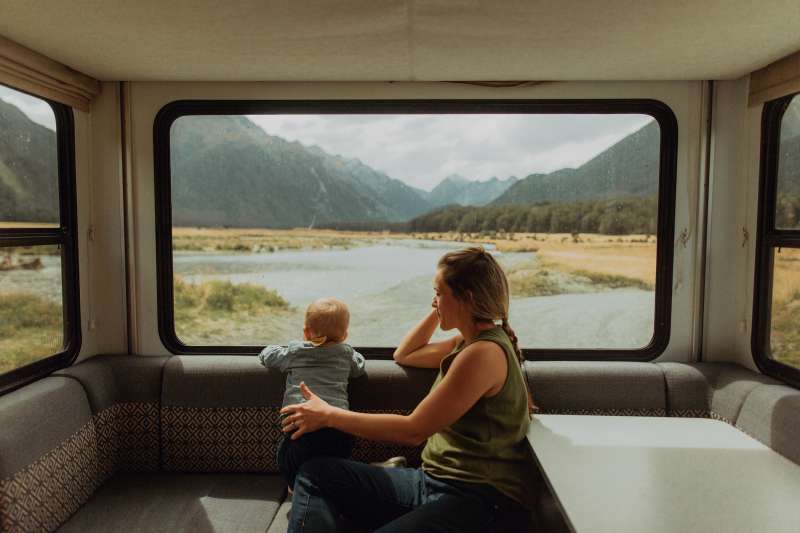How to Live in an RV Full Time

Vans and recreational vehicles (RVs) aren’t just for weekend trips and sightseeing. These vehicles have become trendy living options for people looking for lower living costs and greater flexibility. That said, this lifestyle comes with its own set of challenges and rewards. Read on to learn our tips for living in an RV full time.
What to consider before living in an RV full time
Transitioning from traditional housing to living in an RV full time is a big change. You’ll want to carefully plan all aspects of this new living situation before moving into a house on wheels. To do so, keep the following factors in mind.
Cost of RV living
Full-time RV-ers cite monthly costs ranging from $1,000 for minimalist, frugal living to $5,000 on the higher end. As you can see, the cost of living range is very broad and varies depending on the following factors:
- The type of RV you purchase, along with its insurance policy
- How far you’ll drive
- Where you’ll park the vehicle
The best way to figure out how much it will cost is to add your current monthly expenses and compare them to the estimated cost of living in an RV full time.
Account for expenses like:
- Fuel
- RV insurance
- Maintenance and repairs
- Everyday RV supplies
- Upgrades
- Tolls
- Tank dumping and filling fees
It may be difficult to know how much you’ll spend in each of these categories before starting your full-time RV life, but consider doing some online research to get a better idea. There are countless online blogs and active online communities on Reddit where people chronicle their experiences and answer common questions.
RV parking expenses
Where you park your RV can increase your overall living expenses past the average threshold. Landowners can save the most money as they can park the RV on their own land for free, except for the property taxes.
Some places where you can park your RV for free overnight to reduce your living cost include:
- Truck and rest stops
- Service centers
- (Some) Walmart parking lots
- Parking lots at other big box stores like Cabela’s and Home Depot
- Bureau of Land Management (BLM) land
- Certain gas stations
Parking at national parks and forests is also a popular option. Just remember that many charge overnight fees or require a permit.
If you park your RV overnight at a private business, it’s polite and expected to patronize that business. Follow the rules wherever you stay to be respectful and avoid getting kicked out.
An RV park is the next option if you get tired of constantly moving from one overnight spot to the next. Private RV parks are the most expensive but also the most convenient, as these typically include sewage, water and electricity amenities. Expect to pay an average of $30 per night, according to J.D. Power’s guide on how to plan a camping budget.
More affordable public campgrounds cost around $20 but you’ll have to account for other expenses such as generator fuel. You should be able to find an RV park that fits your budget. Plus, you may get a discount on the daily rate when you stay long-term and pay monthly.
Internet options for RVs
Finding reliable internet on a regular basis is challenging when you’re living in an RV. You can explore the following options:
- Free WiFi networks: Public libraries, McDonald’s, Starbucks and other franchises with free internet work in a pinch, but you might need internet access more often than that, especially if you work remotely.
- Satellite internet: You can get an internet connection even in remote areas, as long as you have a clear view of the sky. However, a significant drawback is that you won’t be able to access the satellites while you’re moving. You may also need to sign a 2-year contract with your satellite provider.
- Portable cellular router: You can add a cellular router with a modem to your existing mobile plan. This can be expensive but will give you great traveling RV internet service. A typical home internet setup has a router plugged into a modem, which is connected to underground network cables. Portable cellular routers access the internet through cellular towers and don’t need to be physically plugged into anything.
- Campground or RV park WiFI: WiFi connectivity may be included in the campground fees you pay. That said, you might need to purchase a WiFi extender to get a strong, stable signal, as the signal quality dwindles the more people use the same network.
RV liability insurance
Most states require you to carry RV liability insurance if you drive a self-powered, motorized RV — no matter how old your RV is. And, if you have a loan on your RV, the lender will typically require it.
RV liability insurance provides coverage for injuries and vehicle damage you cause during at-fault accidents. It has two key components — bodily injury liability and property damage liability.
- Bodily injury liability coverage: The insurance carrier will pay for the medical expenses of other drivers or pedestrians if you’re responsible for an accident in your RV.
- Property liability coverage: The insurer pays for damages (up to the policy’s limit) to other vehicles or personal property if you cause an accident in your RV.
Check your state laws to find out whether you need to carry RV liability insurance. If so, explore the best RV insurance options to find the right choice for your needs.
The benefits of full-time RV life
There are many benefits to living in an RV full time, including the following:
- Travel: When you live in an RV, it’s much easier to pick up and travel anywhere the roads can take you. You don’t have to worry about accommodations at your destination — you’re bringing your housing with you.
- Enjoy your freedom: Living in an RV affords you more freedom than traditional housing. You aren’t tied to a specific location. Instead, you can freely move when it suits you.
- Be more eco-friendly: You may consume less energy and fewer resources in your RV compared to a traditional home. Many full-time RVers invest in solar panels to create their own power and be more sustainable. Of course, you still have to fuel your RV, so it’s not entirely sustainable living.
- Meet new people: If you travel in your RV, you’ll likely meet new people along the way and connect with people you wouldn’t have met in a traditional living situation.
Reduced cost of living is another potential benefit of RV living but this depends on your lifestyle. RV living can get quite expensive if you don’t apply cost-saving measures like RV club memberships or dry camping — camping outside a traditional campground without electricity or water hookups.
The downsides of living in an RV full-time
Living in an RV full time isn’t always as glamorous as travel-style bloggers make it seem. Some of the downsides of living this lifestyle include the following:
- Privacy: In campgrounds and some RV parks, privacy may be hard to achieve. You might hear other RVers nearby or barking dogs frequently, for example. If you live with someone else, you’ll also have limited privacy within the RV since there isn’t much space.
- Developing a community: When you live in one place, building a community with the people in your local area is natural. That’s not possible when you move around in an RV. But you can be part of a community with other RVers and bond over your shared RV experiences.
- Extreme weather: RVers have to take more precautions than homeowners or renters when it comes to snow, strong wind, tornadoes and other extreme weather events.
- Temperature fluctuations: RV vehicles aren’t well-insulated and the temperature inside might fluctuate a lot according to the outside conditions. You’ll need extra gear and tools to keep warm during winter and fend off the heat and humidity in hotter climates.
- Depreciation: RVs aren’t an investment. The vehicle, much like a regular car, will depreciate and won’t resell for the price you paid.
- Parking: Finding parking, particularly affordable parking, for your RV can be a challenge. Plan ahead of time and book parking to guarantee that a space will be available when you arrive at your destination.
- Accessing healthcare: If you’re constantly moving around in your RV, it may be challenging to maintain a relationship with healthcare providers you know and trust. In some more remote areas, you may struggle to find providers who offer the care you need.
How to find the perfect RV for a full-time RV lifestyle
If you’re ready to become a full-time RVer, buying an RV is the most important piece of the puzzle. Here are some steps to find your perfect RV.
Make sure you can drive an RV successfully
Driving an RV isn’t like driving a car. RVs are much larger and will take some time to get used to. You can build your confidence by taking a few courses at a local RV driving school. Many dealerships may also allow you to take the RV for a test drive.
Start by driving slowly and practicing in an open area like an empty parking lot. You’ll have to learn to make wider turns since RVs are much less maneuverable than most passenger vehicles.
Consider all the types of RVs
There’s more than one type of RV, and you’ll have to decide which is best for your needs. Here are some options to consider:
- Class A diesel motorhomes: These luxury RVs provide a smooth ride and more power than the average gas RV. They’re great for full-time RVers who want space to spread out and relax.
- Class B motorhomes: Much smaller than class A motorhomes, class B motorhomes are also known as camper vans. They’re easier to maneuver and park, but the trade-off is less space to live in.
- Travel trailers: These RVs require a vehicle to tow them along but offer great flexibility and freedom. You can easily detach the travel trailer from your towing vehicle and set it up at a campground.
Identify an ideal floor plan
The ideal floor plan for your RV depends on your living preferences and how many occupants you’ll have. For example, you may want room for a play area if you have kids.
To pick the right floor plan, consider the following:
- Location of entry doors and how people will move in and out of the RV
- Solutions that maximize the storage capacity
- Windows that let the light and air in
- Functional bathroom, bedroom and kitchen area
- Wall slides that increase the living area of the RV when it's stationary
- Accessible kitchen, bathroom and sleeping areas
Learn about how RV financing works
You’ll need to explore financing options if you can’t pay for your RV in cash. You can get RV financing from a dealership, online lenders, a traditional bank or a credit union. Compare interest rates on the RV loans and check what amount you’re eligible for from each lender. This information will inform your budget once you start shopping.
Summary of living in an RV full time
Living in an RV full time is an appealing prospect for those who want more freedom and flexibility. If you’re going to become a full-time RVer, remember the following:
- Full-time RV living might reduce your overall cost of living but it depends on your lifestyle, where you live and the cost-saving measures you employ in your mobile home.
- RV living comes with its own set of challenges and rewards. Read blogs, ask questions in online forums and get insight from other RVers before making this your permanent home.
- Take some time to figure out the best vehicle for your needs, whether you’re a solo traveler or plan to move your entire family into an RV. Compare types of vehicles, floor plans and research the financing options available.

